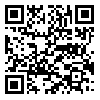Volume 11, Issue 1 (Journal of Science and Technology of Greenhouse Culture 2020)
2020, 11(1): 59-69 |
Back to browse issues page
1- Dept. of Hort. Sci., Univ. of Mohaghegh Ardabili, Ardabil, Iran. , behsmaiel@yahoo.com
2- Dept. of Hort. Sci., Univ. of Mohaghegh Ardabili, Ardabil, Iran.
2- Dept. of Hort. Sci., Univ. of Mohaghegh Ardabili, Ardabil, Iran.
Abstract: (5142 Views)
Drought stress is one of the most important restricting factors for plant yield in arid and semi-arid regions. Seaweed extract, as a biofertilizer, enhances plant resistance against abiotic stresses via accelerating seed germination, root growth enhancement and uptake of plant nutrients. The present research was carried out to investigate the effects of foliar spraying of Ascophyllum nodosum seaweed extract on physiological and biochemical characteristics of basil (Ocimum basilicum L.), Shahre-ray local cultivar, under drought-stress conditions, as a factorial experiment, based on completely randomized design with three replications. Experimental factors included drought stress (full irrigation (control), irrigation holding at first stage of flowering, irrigation holding at 50% of flowering) and foliar spraying of different concentrations of seaweed extract (0, 0.5, 1 and 2 g/L). Control plants were sprayed with distilled water. Results indicated that as drought-stress intensity was increased, morphological traits such as number of lateral shoots, fresh and dry weights of plant, number of leaves, leaf area, root dry weight and biochemical parameters such as chlorophyll a, chlorophyll b, total chlorophyll, carotenoid content and relative water content of leaves were reduced, while free proline content of leaves and electrolyte leakage from cell membranes were increased. Foliar spraying of 2 g/L seaweed extract significantly reduced the effects of drought stress on basil plants. In general, the results of this research indicated that exogenous application of seaweed extract enhanced basil plant growth under drought-stress conditions via increasing proline content, osmotic adjustment, inhibition of chlorophyll degradation and decreasing the electrolyte leakage.
Type of Study: Research |
Send email to the article author
| Rights and permissions | |
 |
This work is licensed under a Creative Commons Attribution-NonCommercial 4.0 International License. |







